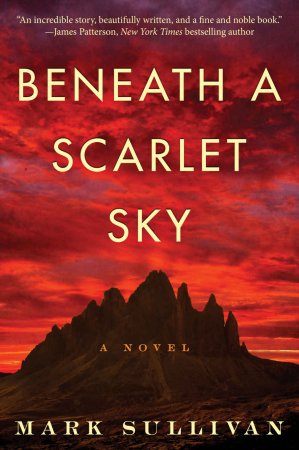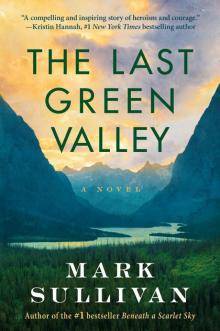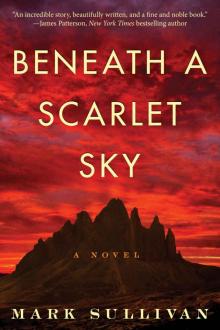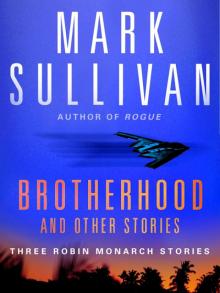- Home
- Mark Sullivan
The Purification Ceremony
The Purification Ceremony Read online
"There are few great thrillers. The Purification Ceremony is among them. Outstanding."
-The Los Angeles Times
"Superbly written. A remarkable book. Uniquely scarey."
-London Literary Review
"Brilliantly crafted and told. Not to be missed."
The Chicago Tribune
THE PURIFICATION CEREMONY
by Mark T Sullivan
Published by Mark T Sullivan at Smashwords
Copyright 1997 & 2009 Mark T Sullivan
Visit his website at http://www.marktsullivan.com
The Purification Ceremony is a work of fiction. Names, characters, places, and incidents either are the product of the author's imagination or are used fictitiously. Any resemblance to actual events, locales, organizations, or persons, living or dead, is entirely coincidental and beyond the intent of either the author or the publisher.
Digital license Notes
If you chose to purchase this ebook, please know that it is licensed for your personal enjoyment only. This ebook may not be re-sold or given away to other people. If you would like to share this book with another person, please purchase an additional copy for each person you share it with. If you’re reading this book and did not purchase it, or it was not purchased for your use only, then you should return to Smashwords.com and purchase your own copy. Thank you for respecting the hard work of this author.
If you have downloaded this ebook for free in exchange for your e-mail address through Smashwords, you may not give it away to other people. If you would like to share this book with another person, please have them return to Smashwords, enter their e-mail address and download another copy for them.
For information address: [email protected].
THE PURIFICATION CEREMONY
by Mark T Sullivan
For Connor and Bridger
"We are murderers and cannot live without murdering. The whole of nature is based on murder . . ."—MARIE-LOUISE VON FRANZ
“In the end, the hunter really hunts himself" —HUICHOL INDIAN SAYING
EARLY AUTUMN
Here lives my story.
My name is Diana Jackman, but I think of myself these days as Little Crow, which is what I was called as a child. I am a mother and an environmental software writer. I am also a hunter: a deer hunter, to be precise; a tracking deer hunter, to be more precise still. You might ask how, in this day and age, a woman comes to be a tracking deer hunter and I'd answer: my mother and father and great-uncle. You might ask why I did not track for nearly fifteen years and I'd give you the same answer. And you might ask how I got involved in the terrible events of that November and I'd tell you to sit down and listen.
The facts of what happened in the months before I arrived in British Columbia are thin, and I've been forced to rely on my imagination for much of what must have occurred before I entered into the course of the story.
But these few things I know: Pawlett had read the signs accurately. The approaching winter would be early and cruel. The webs of brown spiders hung broad and complicated from the eaves of his cabin. Geese arced south the Tuesday before Labor Day. And the ermines, the best hunters Pawlett knew, had become inordinately vicious in their autumn pursuits.
This last had evidently bothered Pawlett, for he had a strange encounter with an ermine mid-September near Frenchman's Creek, and he was a superstitious man. That morning he grouse-hunted in an aspen regrowth above fresh logging slash. The birds were plentiful and he had shot several. He was on his way back to his cabin about eleven o'clock when he spotted the hare.
I see it plump from a summer feeding on green shoots, the rabbit's fur just beginning the change toward winter white. It crouches at the root end of a blowdown aspen, nervous, its nose pulsing for scent. The gaunt woodsman scratches at the itch of the skin sore under his gray beard. He flicks off the safety on his battered 12-gauge pump and takes an easy step forward, preparing to shoot.
He freezes the gun midway to his shoulder. An ermine, twelve inches long, with a chocolate back and a snow belly, crawls out onto the log. Pawlett smiles. He is a trapper by trade. Come November, the ermine's fur will turn the color of fresh cream. Ermine pelts, despite the efforts of animal rights activists, are still worth their weight in gold. He decides he'll be back with traps in a few months.
Then the weasel does something that makes the old trapper shiver. It turns and stares at him condescendingly, as if it has been aware of his presence all along and doesn't care. The ebony BB eyes roll with blood intent. The animal arches up on its tiptoes and pours toward him. Pawlett has never seen an ermine display such boldness in the presence of a human and he finds himself retreating.
The ermine smirks at Pawlett's distress. When the trapper reaches the bend in the logging road, the animal turns its back on him and slinks into the root system above the hare. The rabbit is twice the weasel in weight, but without hesitation the predator drops onto the neck of its prey. The high-pitched cry of the hare as it leaps away, trying to shake its aggressor, is like the noises I used to hear in the night when one of my babies would suffer night terrors.
Pawlett waits five minutes after the cries have stopped, then creeps forward. When he rounds the root stem, he swallows. The entire throat of the hare has been torn out. For a moment Pawlett thinks the ermine has heard him coming and fled. Then the torso of the hare shakes, and from the throat itself, the ermine pokes its head out and hisses at him.
Pawlett did not return to the woods for nearly a month after the encounter. He believed in nature's ability to presage the future with signs. He got it into his head that the hare's death foretold his own demise; and he did not hunt, or fish, or grease his traps that October. He spent his time splitting kindling. He ate from berry preserves he'd put up in August. He swilled cocktails of Sterno diluted in branch water to mask the memory of the weasel.
One morning in mid-October, a man named Curly arrived outside Pawlett's cabin in a brand-new, red four-wheel-drive Dodge pickup. Curly always came this time of year. He was chief of security for Metcalfe Timber, the company that owned or controlled logging rights on much of the vast terrain in which Pawlett eked out a living.
The way Curly tells it, Metcalfe Timber had camps throughout this part of British Columbia, hard by the border with Alberta, some of them in constant use, others on a sporadic basis. Because Pawlett was one of the few people who ever ventured into the deep wilderness after the first of November, Curly hired him to make regular checks on the various outbuildings and logging camps not currently occupied. In return, Curly gave Pawlett five hundred pounds of provisions and the right to trap on the land.
"Ain't going out this season," Pawlett said when Curly came through the door hauling a fifty-pound sack of flour and a box of .30-.30 rifle shells.
Curly said the interior of the cabin looked as it always did. Two rudely crafted stools stood next to a battered Formica kitchen table. A hand pump jutted from the sink piled high with dirty dishes. Traps hung from the walls. Under them, the shelves were stocked with golden liquids in pale bottles—Pawlett's trapping tinctures of urine and God only knew what else. Abandoned birds' nests in the rafters. A potbellied woodstove glowed red; its damper begged for repair. The door clung to the cupboard by one fractured hinge. Inside were mason jars stuffed with vegetables Pawlett grew in his summer garden and tins of trout and salmon he smoked in a shed outside. The wall above Pawlett's bunk bed was decorated with a moth-eaten bear skin.
Curly said the man himself rarely bathed. His oily hair was plastered to his head. Scabs poked through his beard. Not to mention the sick stench of his clothes. Curly hated going to Pawlett's cabin.
"Not going out this winter, eh?" Curly said.
&
nbsp; "I had a bad vision last month," Pawlett replied. "I stays here this winter, Curly, wait till it passes."
Curly smiled. "Not here, old-timer. The company owns this cabin and we let you stay here by the goodness of our heart. We need someone making the route this winter. Doesn't matter to me if it's you or someone else. If it's someone else, there's no need for us to keep this dump in its present state. Now, do I bring in the rest of your stuff, or do I radio out to bring in a bulldozer and raze your rathole, eh?"
Pawlett screwed up his face and forced his eyes to focus on the lumberman. The set of his lips did not offer hope. "But everything I own is in here, Curly."
"A damn shame," Curly agreed.
Pawlett rubbed his throbbing temple and forced his brain to consider the options. After a few minutes he sighed.
"Okay, bring it all in. Maybe I read the sign wrong, eh?"
"I'll bet you did," Curly replied. He went back to the truck and brought in the rest of the things Pawlett had requested early in the summer: fifty pounds of dried milk, one hundred pounds of dried fruit, shotgun shells, six gallons of rye whiskey, a new wool mackinaw, a set of those modern alloy snowshoes, a pair of deerskin mitts, a new leatherman tool, and oil, gas and a starter motor and carburetor for his aging snowmobile.
Before letting Pawlett sign for the goods, Curly reviewed the terms of their contract. During the course of the winter, beginning at the end of October, Pawlett would check each of the buildings three times. In those buildings with a working radiophone, he was to call in to the main office and report on his progress.
When Pawlett asked if he should check in on the estate, Curly told him not until December at least; an outfitter had leased the property for a whitetail deer hunt in mid- November.
"Be good hunting, seeing how no one's been in there the three years since the old man disappeared," Pawlett observed.
" 'Cept you, of course."
"I never shot no deer on the estate," Pawlett protested.
"A law-abiding citizen, you're telling me," Curly said, almost laughing.
"Ya always said it was off-limits, Curly. I pay mind to what's told me."
"Be sure you do, eh?" Curly said. His lips set thin and hard again. "Someone'll be in here mid-January to pick up your furs.”
#
Everything else I will tell you of Pawlett is based on what was left behind. But since I became an integral part of it all, I'm sure you'll allow me my version.
November arrives mild with easy breezes, weather that helps Pawlett to put the weasel behind him. He sobers up. And three weeks after Curly's visit, he's fallen into the daily rhythm of scouting the perimeter of his hundred-mile trapline.
At the end of the first week of November, he decides to make the trek through Barris Basin and over Wolf Ridge onto the series of flats and peaks toward Metcalfe Logging Camp Four, which abuts the Metcalfe Estate. He shoulders his pack, annoyed that the lack of snow makes it impossible for him to use his snowmobile.
Near the end of the first day of hiking, during which he covers twelve of the twenty-five miles, the wind shifts from south to north, bringing with it blue clouds and the heaviness of increasing humidity.
Pawlett studies the sky and shivers. "Sure enough, we're in for it now."
Wildlife activity picks up in anticipation of the approaching storm. Scrub jays caw. They swoop through the tag alders of a swamp he skirts. He glimpses a moose crashing away at the far side of a clear-cut. A fat whitetail doe feeds on a flat near one of the lean-tos he maintains for his winter work. He shoots it.
Pawlett cleans and skins the deer as the first snowflakes appear. He quarters it, then salts the meat and wraps it in cheesecloth. He hangs the quarters high in the branches of a tree next to a lean-to where it will cool and eventually freeze. If the bears do not get the meat, it will be there when he returns by snowmobile later in the month. When darkness comes, he builds a fire, roasts the deer's liver and eats it. Snow falls.
When I think of Pawlett at this point, I always pray that he sleeps peacefully.
There are six inches of powder snow on the ground by morning, which dawns blustery and cold. Pawlett eats more of the liver with a cup of black coffee and moves on.
At two o'clock that afternoon, Pawlett catches sight of his destination. Active logging at Camp Four was abandoned nearly ten years earlier. But the company still uses it to store spare parts for the skidders and to act as sleeping quarters for the old logging crews called in to perform small clear-cuts for the benefit of the deer on the estate. It's also where supplies too large to be flown into the estate are brought for final transport during the summer, when the two-track road is passable.
Pawlett wipes his nose on his sleeve, then trudges down the hill through the fresh snow that has blown in among a sparse stand of ponderosa pines. He enters an overgrown meadow. At the far end stands an Army-surplus Quonset hut that once served as office, kitchen and bunkhouse to the loggers. Beyond that are three prefabricated metal storage sheds.
The wind picks up. The sun breaks through the clouds, forcing the trapper to squint at the glare thrown off by the snow and the metal walls of the storage units. He stops halfway across the yard. Human footprints? He frowns and kneels. Judging from the depth of the prints and their angle, whoever made them has been carrying a heavy load. And the wind marring along the rim of the tracks tells him they'd been made sometime earlier that morning.
Pawlett glances all around him at the surface of the snow, blazing like millions of diamonds in the sun. No other sign save this line heading off in the direction of the logging road that leads southeast toward the estate. I believe he considers the possibility that the outfitter Curly had spoken of has traveled the thirty-odd miles out from the lake—where old man Metcalfe had his hunting lodge— looking for parts. But where are the tracks of the snowmobiles Pawlett has seen around the lodge during his clandestine hunting trips in previous falls?
He drops his pack off one shoulder and slides the leveraction rifle from the side compression straps. He stands and shouts, "Hello! Hello the camp!"
Behind him, the wind causes a clacking of branches against the sheds, but no voice raises in response. He calls again and waits. Again nothing. Two crows drift through the far tree line.
He looks back at the track. One of the paying hunters? Curly said the outfitter's clients weren't coming until the middle of the month, when the rut, the whitetail mating season, would peak. A resident hunter? Pawlett probably dismisses the idea. This part of Metcalfe terrain is off-limits, and besides, it is nearly sixty miles to the nearest town by some of the roughest two-tracks Pawlett knows.Too far and too much of a hassle to come hunt here, even if the estate is home to some of the biggest deer in the world. Besides, most locals Pawlett knows are interested in meat, not big antlers.
Maybe the outfitter or one of his guides spent the night after scouting the perimeter of the estate and kept his vehicle back there in the forest? That would seem the most logical solution, and I believe Pawlett adopts it.
He holds the gun level with his hip. He follows the blurred tracks to the door of the Quonset hut and prepares to kneel to fish the keys from behind the wooden stoop when he sees that one of the windowpanes in the door has been broken and patched over with cardboard and duct tape. He climbs the stoop and tried the knob. It turns. Pawlett lets the door swing open on the wind.
"Hello?" he calls into the dim interior. "Anybody here?"
The air inside rolls to Pawlett. He smells stale smoke, cooked meat and a musky, animal smell. He steps over the transom. The floor is plywood. The tread of his boots makes scratching noises as he moves past a busted table and lets his eyes become accustomed to the feeble light.
On his left is a door he knows leads to the bunkhouse. He goes by that and into the main room. Here the logging foreman used to have his office. And the crews ate at picnic tables and lounged in a couple of sprung couches that had been hauled in years ago. Nothing has changed since Pawlett's last visit.
I think he returns through the main room then, and, with the gun before him, nudges open the door to the bunkhouse. He waits for a moment, then goes inside. The light is worse than in the main room. He strains to see, and strains again to make sure he's right. Pawlett finds enough gear in there to support a man for at least a month in the wilderness. Dozens of freeze-dried meals held together in stacks by rubber bands. Four two-gallon water containers and a filtration kit. A down sleeping bag. A bivvy sack. Several clear plastic tarps. Three wool shirts. Two pairs of wool twill pants. Twelve pairs of wool socks. Two complete sets of expedition-weight long underwear, including the balaclava hoods. A black knit watch cap. One pair of leather boots similar to his own and a second pair of deep-snow pac boots with a fur cuff. A gray camouflage outfit in fleece. A flashlight with ten sets of batteries. A camping lantern and two gallons of white fuel. A folding pack saw. And more equipment stacked in the corner where the light is worse.

 Beneath a Scarlet Sky
Beneath a Scarlet Sky The Last Green Valley
The Last Green Valley Beneath a Scarlet Sky: A Novel
Beneath a Scarlet Sky: A Novel Brotherhood and Others
Brotherhood and Others The Purification Ceremony
The Purification Ceremony